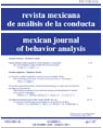Power functions in schoolchildren’s obedience and compliance.
Main Article Content
Abstract
Two experiments were designed to evaluate the effects of power functions proposed by Ribes (2001) in schoolchildren’s obedience and compliance. In the Experiment 1,the effect of these functions were compared by the establishment of: 1) the experimenter intervention, who in a first phase of the experiments, he acted like an authority figure with power based on the force (obedience), and b) the familiarization with the experimenter without authority function in the experimental situation (compliance). Meanwhile in the Experiment 2, the experimenter acted like an authority figure with power based on the richness (obedience). It was found that participants exposed to an authority with power based on the force were more obedient that participants exposed to an authority with power based on the richness, and participants exposed to conditions of familiarization with the experimenter.
